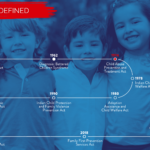
As humans, we all have a voice but we may not feel empowered to use it, especially in a way that influences. To fully “have a voice” you must embrace your thoughts and experiences in order to communicate them effectively. Your words hold weight. Your point of view is important and plays a role in swaying decisions.
Children, specifically, often feel like they don’t have a voice. They feel unheard. After all, they are also often competing with the louder, often stronger, voices of adults.
Our upcoming blog posts in February will delve into the notion of having a voice. A great launching point for this dialogue is National CASA’s Reading List. We’ve recommended a few books below. Each one highlights an author who found their voice, using extreme challenges as a means for educating, engaging, and influencing readers.
Educated by: Tara Westover Born to survivalists in the mountains of Idaho, Tara Westover was seventeen the first time she set foot in a classroom. Her family was so isolated from mainstream society that there was no one to ensure the children received an education, and no one to intervene when one of Tara’s older brothers became violent. When another brother got himself into college, Tara decided to try a new kind of life. Her quest for knowledge transformed her, taking her over oceans and across continents, to Harvard and to Cambridge University. Only then would she wonder if she’d traveled too far, if there was still a way home.
Damaged by: Cathy Glass A true story of an abused child written by Cathy Glass. Cathy was Jodie’s foster parent and writes about the time she spent with her child. Jodie is removed from her home when she is eight years old because of suspected child abuse by her parents. After being in five foster homes within four months, social services contacted Cathy to see if she would take Jodie and care for her. Cathy has been a foster parent for twenty years and has had success with all the children for whom she has cared.
Mama’s Boy: Preacher’s Son by: Kevin Jennings “Growing up poor in the South, Kevin Jennings learned a lot of things, especially about how to be a real man. When his father, a fundamentalist preacher, dropped dead at his son’s eighth birthday party, Kevin already knew he wasn’t supposed to cry. He also knew there was no salvation for homosexuals, who weren’t “real men”–Or Christians, for that matter. But Jennings found his salvation in school, inspired by his mother. Self-taught, from Appalachia, her formal education had ended in sixth grade, but she was determined that her son would be the first member of their extended family to go to college, even if it meant going North. Kevin, propelled by her dream, found a world beyond poverty. He earned a scholarship to Harvard and there learned not only about history and literature, but also that it was possible to live openly as a gay man. But when Jennings discovered his vocation as a teacher and returned to high school to teach, he was forced back into the closet. He saw countless teachers and students struggling with their sexual orientation and desperately trying to hide their identity. For Jennings, coming out the second time was more complicated and much more important than the first–because this time he was leading a movement for justice.”
I Never Told Anyone by: Ellen Bass Deeply moving testimonies by women survivors of child sexual abuse.









